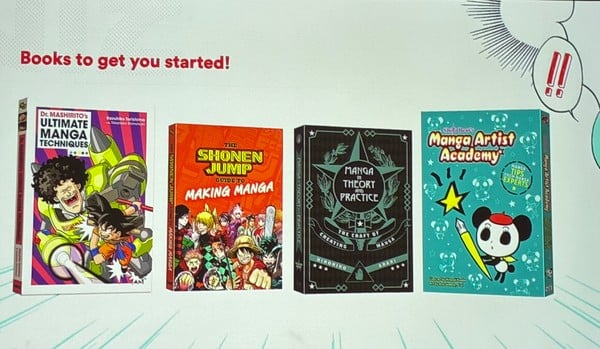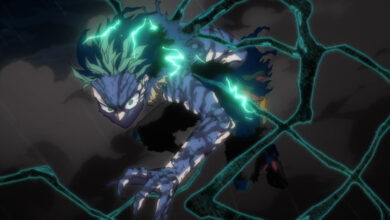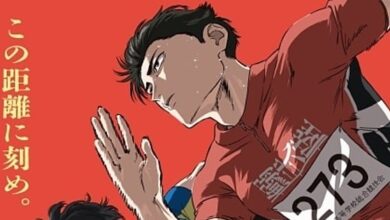The Anime NYC Guide to Working in the American Manga Industry – All the News and Reviews from Anime NYC 2025

How many of the 148,000 attendees Anime New York Want to find a job in the comics business in 2025? Probably a lot – at least five groups focused on career building, even in the niche of questions and answers that are not related to group discussions, there are often questions, “How did I find a job here?” The comic career activity takes place on two separate tracks: one focused on the job of releasing Japanese comics in the United States, and the other is aspiring comic artists who try to create their own original English work. For enthusiastic fans, both professions have promised opportunities and challenges.
Many ways to publish
this Kodansha– Sponsored panel “Multiple ways to break into comics”, hosting Kodansha Senior Editor TJ Verentini, someone who works in different positions at different publishing companies: Lydia Nguyen (Assistant Editor of Abrams), Shirley Feng (Production Manager Kodansha), Mark de Vera (Sales and Marketing Manager Yen Publishing House), Ricky Uy (founder of Komodo) and Morgan Perry square comics). Each group member took a different path. De Vera worked throughout her adult life in the comics, from Right now Before joining Yen Publishing House. UY, by contrast, worked on the gaming industry’s user interface before transitioning to the digital comics space, while Nguyen worked at Starbucks while pursuing the art of freelance. Fang initially stretched out Kodansha She was turned down during her production job in 2020, but her portfolio eventually led to her being hired for free logo design, which eventually led to her being promoted to the job she wanted.
One of the biggest benefits of this panel is that any work experience can give you the skills you can use for a comic company job. Verentini told attendees: “Don’t knock on any experience you have right now.” However, you need to know which skills are useful for which positions. For example, editorial positions require Japanese skills to review potential licensing and verify the accuracy of translations, while other jobs do not have these requirements. Bookstore experience is particularly valuable in publishing, and Fanzines and amateur goods provide a good background for production work. Connection is essential for applying for jobs – it is de Vera’s advice that takes Perry beyond AI filters on LinkedIn.
“Yen Publishing House Gift: Working in the Comics Industry” covers similar grounds and shares a group member (Mark de Villa) while exploring the different characters needed in comics publishing. Thomas McAllister explains his work as the ultimate arbiter of books, is the ultimate arbiter of a book and is expected to be an expert on every title. Madelaine Norman He is a senior designer responsible for cover and logo design, committed to matching the Japanese version as much as possible. Yen production coordinator Kou Chen was unable to participate, but the team explained that his work focused on communication and file transfer. de Vera talks about the sales aspect of his sales and marketing position, involving working with distributors, managing inventory and identifying possible hits. By contrast, group host Ashley Spruill spoke of being a marketing and publicity manager dedicated to promoting books with the media, influencers and practices, while also handling communication between departments.
McAllister says any writing, Dungeons and Dragons sports Fan Novels To master the paper, it can be used in the application of editing work. McClutchen recommends getting to know the Chicago Style Manual. Regarding sales work, de Vera says that in addition to retail experience, Excel’s knowledge is also useful for the knowledge you have. Regarding marketing, Spruill notes that it is necessary to be familiar with major news media. During the Q&A, attendees had questions about other jobs in the industry, such as IT positions (the yen is hiring for these jobs, with IT people almost on the panel), writing original comics (Yen didn’t do a lot of things Oil Project) and start a new company (de Vera suggests with Danpa About that).
Yen Publishing House“Other panels, “Design for the Better World of Comics,” specializes in graphic design work. De Vera hosted by Norman, who joined Yen’s associate artistic director Andy Swift, took part in the group Lilliana Checoand Amy Chen, Marketing Design Assistant. The team provides insight into the process of designing books and their accompanying marketing materials. For regular comic book scrolls, the golden rule is always to match the original as much as possible. However, converting Japanese text to English means that logos and back covers require creativity.
Based on a design profile that describes the comic plot and target audience, and including a comparison logo, Norman will try different fonts and designs before introducing three versions for editors to make a final decision. The comparison of design profiles is usually from other comics, but sometimes other sources of inspiration – for 70s-style fonts gogogo-go-go-ghost!Blaxploitation movie poster Superfly It’s a reference. For boxed and special editions without direct Japanese equivalents, designers can get extra creativity – Swift shows off his various drafts Delicious in the dungeon Box Set (initially, he wanted an actual 3D simulator to pop the box!).


The general atmosphere of these publishing career groups is encouraging. The overall news is that if you know what you are good at and who you talk to, you can find a job that suits your talent in the comics business – if you participated in these panels at this conference, you already have an advantage in the “Who to talk to” part of the equation. Sometimes you may feel that the group members are doing their best to be encouraging (when someone asks if he can find his job in a cryptocurrency job in a comic, de Vera answers a question that certainly sounds like a question: “It sounds like you have solid marketing skills?”). Although manifested as achievable work, the other side to remember is that these are still work. The workload is heavy – editors can work in 20 to 45 books a year; marketing designers will do 10-15 projects a week during the conference season – salary is not necessarily spectacular.
For writers and artists
What if you want to make your own comic? Ignore the semantic debate about whether the original English comic counts as “comics”, Anime New York References are also provided. Deer,,,,, Right nowThe original publishing director of creative content talks about “with Right now“about Right now Original and single-shot programs (for serialization and standalone comics, respectively).
Liu acknowledges that certain stylistic identifiers are her criteria: layout (smaller than other comics, characters usually take precedence over the background), sound effects (the size of fx represents volume and can be very subtle), but not unique in comics (same as comics) (spelling) (spelling) (spelling) (spelling) (spelling) (spelling) (spelling) (spelling) (spelling) (spelling) (spelling) (spelling) (spelling) (spelling) (spelling) (spelling) or humor, but not critical to drawing). She explains the process of writing comics (from concepts and contours to visual development, scripts and thumbnails to pencils, inks, and final art and lettering). She recommended books on the subject (Dr. Mashirito’s ultimate comic technique, Shonen Jump A guide to making comics, Hirokohi Anaki‘ Theoretical comicsand Shojo defeatedThe Academy of Comic Artists).

Right now The original work and single shots are open viz.com/createthey will make portfolio comments at the conference. Originality and layered characters are the big things they want: “If you’re inspired by many things that already exist and just try to make things like most readers, it’s obvious”, and the ongoing original work requires a higher standard of quality than a single shot. For creators who want to know how to sell large ideas in one-time sale, Lau suggests as inspiration Eiichiro OdaThe frontpiece Stories, collection wanted! Before Eichiiro Oda piece.
get OOL Comics It’s hard to publish in Japan Right now The original Devil’s Candy This is done, even if it is impossible. “Create your lane in comics and comics”, back to Anime New York The second time provides a conversation between the author and the color artist currently working in the comics. Bria Strothers hosted by Lucy Camacho (Hero circleIDW Monster tall), Wendy Xu (Infinite particles, tides), Murakami Teeth (Annoying people, are you afraid of the darkness? : The sinister sister) and Tony Weaver Jr.Weird, rare).
The group members shared their experiences in traditional publishing and in independent spaces. Camacho has been writing Shojo independently since last year’s group, and too many publishers think “niche” – “Girls media need love too!” she said applause. Murakami’s career development is moving in the opposite direction, transforming her independent project into dissatisfied Enter the first one Right now One blow. This experience is “crazy to say the least.” Xu said of struggling with perfectionism, saying, “Beauty can be found in imperfection.”
Weaver gave him a “three-minute boot camp” at the end of the group discussion, unlike the other group members – “They are good cops, I’m bad cops.” His focus is to make sure you have a business plan and know what you want to achieve, and say, “The live story is the reward story.” You might think of your own story as your child, but “if there is a parent who can’t afford your baby food, you’ll say it’s a bad parent.”
He suggests to view Publisher weekly Track the content of the sale. Because he struggles with multitasking, he writes a full-time job. He also stressed that living in New York is a major advantage of publishing: people in remote areas can try submitting stories: “But when all the editors in the industry sit down for breakfast, you’re not there.”
I was in constant mood at the end of this “Bad Police Training Camp.” In the Internet age, the thing about art and creative writing is that there are much more opportunities to be seen than to be paid, so even when the former is challenging, the latter should be given priority, even if that is an understandable point of view. At least, it is obvious that any craft can be practiced, and all these practices will come before profiting. Finding a successful comic (but you define “success”) is a competitive field, and the path to success is not that simple.




